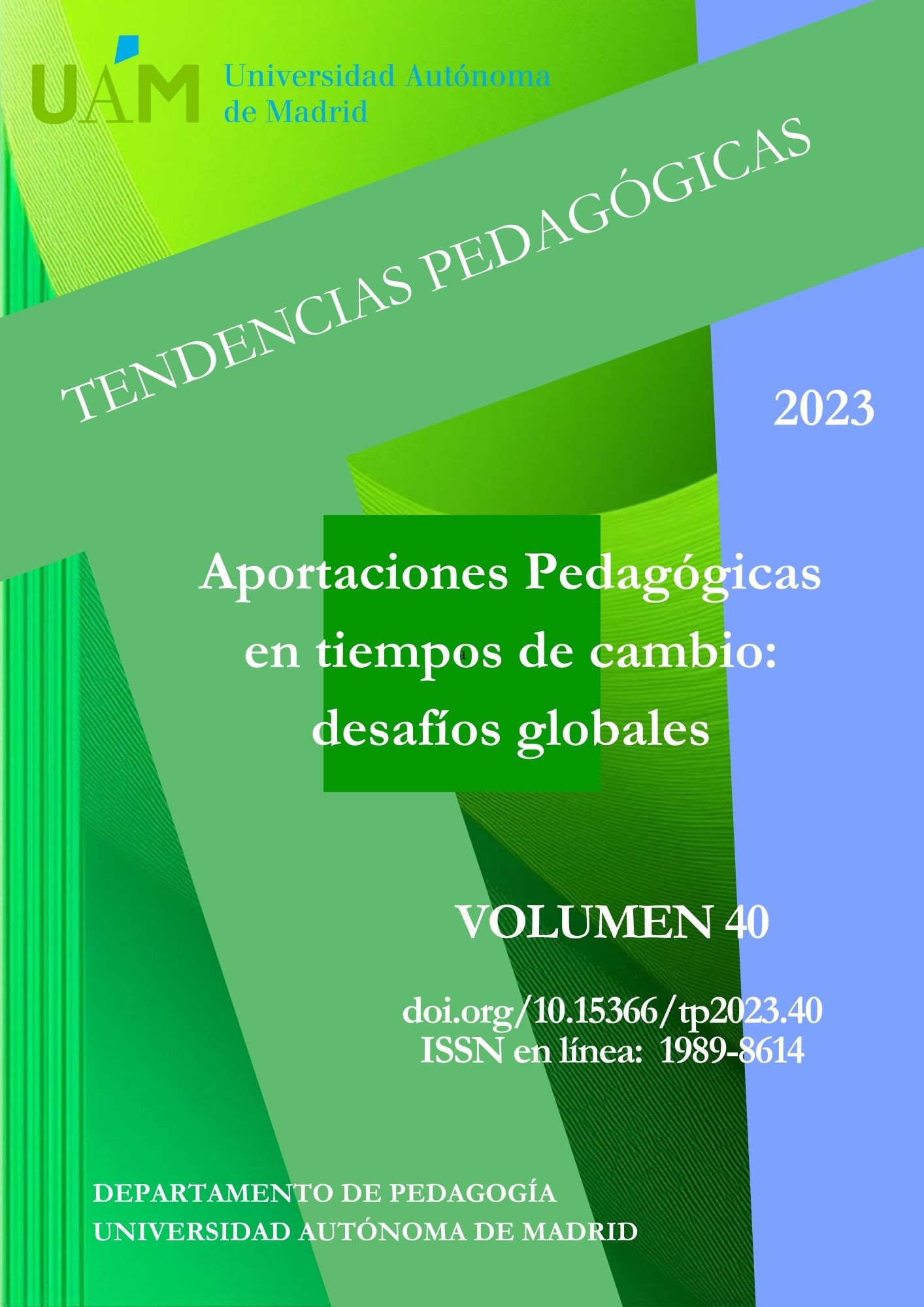Un modelo conceptual de alfabetización emancipadora de adultos: tres pasos metodológicos para analizar los contenidos en libros de texto
Palabras clave:
Educación de adultos, Alfabetización funcional, Aprendizaje de adultos, Libro de texto, Análisis cualitativoDerechos de autor 2025 Fabricio Valentim da Silva

Esta obra está bajo una licencia internacional Creative Commons Atribución-NoComercial 4.0.
Resumen
Esta investigación se centra en el estudio de la noción de emancipación en libros didácticos de inspiración freireana que sirvieron a la alfabetización de adultos en el contexto de la educación postcolonial en el norte de Brasil, entre los años 1960 y 1980. La muestra para la investigación estuvo compuesta por cuatro ejemplares de libros de texto, las Cartillas de Portugués (Alfabetización) Poronga (1983) y O Ribeirinho (1984). Este estudio se apoya en la metodología del análisis de contenido de libros de texto y en la literatura sobre la Educación a la Ciudadanía, permitieron identificar y analizar los elementos de la alfabetización emancipadora, pues el objetivo central fue construir y evaluar la solidez de un modelo conceptual de alfabetización emancipadora a través de tres pasos metodológicos para analizar los contenidos en libros de texto que son favorables para el desarrollo de dicho tipo de alfabetización. Esta investigación ha permitido identificar y describir las dimensiones ideológicas, cognitivas y ciudadanas de la alfabetización emancipadora en el marco de una perspectiva de modelización conceptual y operacionalizar esas dimensiones en criterios de análisis para la adecuación de los libros de texto. El estudio ha permitido también probar y evaluar la consistencia de los criterios en el análisis del potencial emancipador de los libros de texto. Se constató que en la muestra estudiada los tipos del ciudadano orientado a la justicia o de ciudadano participativo forman parte de los criterios que ayudan a definir los contenidos de libros de texto favorables a una alfabetización emancipadora.
Descargas
Citas
Anderson, L.W., Krathwohl, D.R., Airasian, P.W., Cruikshank, K.A., Mayer, R.E., Pintrich, P.R., Raths, J., y Wittrock, M.C. (2001). A taxonomy for learning, teaching, and assessing: A revision of Bloom’s Taxonomy of Educational Objectives. Longman.
Bardin, L. (1975). Le texte et l'image. Communication et langages, 1(26), 98-112. 10.3406/colan.1975.4211
Bardin, L. (1995). Análise de Conteúdo. Lisboa, DL: Edições 70.
Bartlett, L. (2005). Dialogue, knowledge, and teacher-student relations: Freirean pedagogy in theory and practice. Comparative Education Review, 49(3), 344-364. 10.1086/430261
Brandão, C. R. (2015). Círculo de Cultura. En D. R. Streck., E. Redin., y J. J. Zitkoski (coords.), Paulo Freire (2.ed. 328-330). CEAAL.
Brandão, C. R. (2017). A educação como cultura. Memórias dos anos sessenta. Horizontes Antropológicos, 23(49), 377-407. 10.1590/S0104-71832017000300014
Burbules, N., y Berk, R. (1999). Critical thinking and critical pedagogy: Relations, differences, and limits. In T. Popkewitz., y L. Fendler (Eds.), Critical theories in education (45-65). Routledge.
Butler, B.M., Suh, Y., y Scott, W. (2015). Knowledge Transmission Versus Social Transformation: A Critical Analysis of Purpose in Elementary Social Studies Methods Textbooks. Theory y Research in Social Education, 43(1), 102- 134. 10.1080/00933104.2014.999850
Chu, Y. (2017). Twenty Years of Social Studies Textbook Content Analysis: Still “Decidedly Disappointing”? The Social Studies, 108(6), 229-241. 10.1080/00377996.2017.1360240
Desjardins, R. (2015). Education and Social Transformation. European Journal of Education, 50(3), 239-244. 10.1111/ejed.12140
Fávero, O. (2003). A história da alfabetização de adultos em questão. TV Escola, Brasília, DF.
Freire, P. (1970). Cultural action for freedom. Harvard educational review, 40(2), 205-225.
Freire, P. (1987). Pedagogia do Oprimido. Rio de Janeiro: Paz e Terra.
Freire, P. (1993). Política e Educação. Cortez.
Holsti, O. R. (1969). Content analysis for the social sciences and humanities. Reading. MA: Addison-Wesley (content analysis).
Janks, H. (2013). Critical literacy in teaching and research1. Education inquiry, 4(2), 225-242. 10.3402/edui.v4i2.22071
Kahne, J., y Westheimer, J. (2003). Teaching democracy: What schools need to do. Phi Delta Kappan, 85(1), 34-66. 10.1177/00317217030850010
Lavere, D. B. (2010). The Quality of Pedagogical Exercises in U.S. History Textbooks. The Social Studies, 99(1), 3-8. 10.3200/TSSS.99.1.3-8
Roberts, SL (2014). Una revisión de los análisis de contenido de libros de texto de estudios sociales desde 2002. Social Studies Research and Practice , vol. 9, n.º 3, págs. 51-65. 10.1108/SSRP-03-2014-B0004
Romão, J. E. (2012). Paulo Freire e Amílcar Cabral: a descolonização das mentes.
Scott, W., y Suh, Y. (2015). Standardizing the Essential Knowledge, Skills, and Attitudes for Democratic Life: A Content Analysis of Virginia Standards of Learning and Social Studies Textbooks. The Social Studies, 106(3), 92-103. 10.1080/00377996.2015.1005282
Sevier, B. R. (2002). The Creation and Content of an Early “Multicultural” Social Studies Textbook: Learning from People of Denver. Theory y Research in Social Education, 30(1), 116-141. 10.1080/00933104.2002.10473181
Stromquist, N. P. (2009). Literacy and empowerment: A contribution to the debate. Background study commissioned in the framework of the United Nations Literacy Decade, 12.
Stromquist, N. P. (2014). Freire, literacy and emancipatory gender learning. International Review of Education, 60(4), 545-558, 10.1007/s11159-014-9424-2
Stromquist, N. P. (2015). Gender structure and women’s agency: Toward greater theoretical understanding of education for transformation. International Journal of Lifelong Education, 34(1), 59-75. 10.1080/02601370.2014.991524
Trombeta, S. (2015). Mito. En D. R. Streck., E. Redin., y J. J. Zitkoski (Coords.), Diccionario Paulo Freire, 2.ed. (pp. 337-339). CEAAL.
Wade, R. C. (1993). Content analysis of social studies textbooks: A review of ten years of research. Theory y Research in Social Education, 21(3), 232-256. 10.1080/00933104.1993.10505703
Westheimer, J. L., y Kahne, J. (2004). Educating the “good” citizen: Political choices and pedagogical goals. Political Science and Politics, 37(02), 241-247. 10.1017/S1049096504004160
Yoon, B., y Sharif, R. (2015). Future directions for critical literacy practice. In Yoon, B y Sharif, R (Eds.), Critical Literacy Practice (189-192). Springer. 10.1007/978-981-287-567-9_13.

